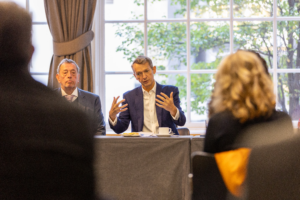The European MOOC Consortium (EMC) launches a Common Microcredential Framework (CMF) to create portable credentials for lifelong learners
At the EADTU-EU Summit 2019, Brussels, the EMC launched a Common Microcredential Framework (CMF) with its founding platform partners including FutureLearn, France Université Numérique (FUN), OpenupEd, Miríadax, and EduOpen.
The move comes in response to demand from learners to develop new knowledge, skills and competencies from shorter, recognised and quality-assured courses, which can also be used to earn traditional university qualifications. The CMF establishes a framework for these goals to be achieved across Europe’s leading MOOC platforms and the universities within their networks. The ambition is to lay the foundations for a new international credential for universities to meet the needs of lifelong learners, globally.
Speaking on behalf of the EMC, Mark Lester, Managing Director for Educational Partnerships at FutureLearn explains, “The world of work is changing fast and the world of learning is changing with it. As the forces of technological innovation drive change at an unprecedented rate, people will need to upskill and re-skill throughout their lives and develop higher order competencies that will underpin a successful career. Leaving work for long periods of time to earn a traditional qualification will be less applicable in this new world and a new solution is needed from the education sector to meet this growing need.
Lester continued, “The current crop of microcredentials have so far popularised short forms of online learning among universities, but the proliferation of different types of microcredentials is becoming confusing to learners and employers. The EMC partners are proud to be collaborating, along with our respective university partners, to try to ensure there is greater consistency, quality and portability built into the microcredentials that we develop.”
Commenting for EADTU, CEO George Ubachs said, “Our member universities steadfastly believe in the importance of flexible modes of learning and we see this initiative as a crucial step in our goal to foster in Europe a more modern, open and flexible higher education system that transcends national boundaries.”
To ensure microcredential courses are built to high quality standards, the CMF requires that microcredential courses are capable of earning academic credit. This requirement ensures courses must be developed within the university’s national qualification framework and, in Europe, in line with the European Qualification Framework (EQF), a common European reference framework whose purpose is to make qualifications more readable and understandable across different countries and systems.
In order to qualify as a microcredential within this framework, a course must adhere to the following specifications:
- Have a total study time of no less than 100 hours and no more than 150 hours, including revision for, and completion of, the Summative Assessment.
- Be levelled at Levels 6-7 in the European Qualification Framework or the equivalent levels in the university’s national qualification framework, or be levelled at Levels 4-5 and fulfil the criteria of the European Credit Transfer and Accumulation System.
- Provide a summative assessment that enables the award of academic credit, either directly following successful completion of a microcredential or via recognition of prior learning upon enrolment as a student on a university’s course of study.
- Operate a reliable method of ID verification at the point of assessment that complies with the university’s policies and/or is widely adopted across the platforms authorised to use the CMF.
- Provide a transcript that sets out the learning outcomes for a microcredential, total study hours required, EQF level and number of credit points earned.
These microcredential courses will aim to be recognisable between different higher education institutions and thereby create an ecosystem where learners can one day take microcredentials from within a network of universities that can be used towards a larger qualification, such as a postgraduate certificate or Masters degree.
Catherine Mongenet, CEO of FUN, commented that, “For us a crucial benefit of the CMF is that it will ensure there is transparency and rigour around the learning outcomes and assessment. This is important in establishing their credibility among our partner universities, as well as by employers”.
Echoing the same theme, Ana Casilda Andrés, CEO de Telefónica Educación Digital & Miríadax, explained: “As the first Ibero-American platform in Spanish, which collaborates with more than 100 universities, we believe that it is essential to have a system of official microcredits that are easily used by corporations to define the competencies and professional knowledge of their employees and that are also fully recognised by the universities that offer them”.
On the rationale for the collaboration, Pierpaolo Limone, representing EduOpen, explained that “We have always believed in the potential for us to create a system where universities on our platform can offer courses recognised by the others – this extends this principle to an international level that is only possible working in partnership”.
The first microcredentials as part of this CMF are expected to be ready for enrolment on the partner platforms, in the second half of 2019. Among them will be a microcredential course from Dublin City University on “Fintech and Strategy in the 21st Century” delivered on FutureLearn.
The CMF will be promoted across Europe by the European Association of Distance Teaching Universities (EADTU) alongside the founding platform partners.
- ENDS –
Notes to Eds:
About European MOOC Consortium (EMC)
The European MOOC Consortium (EMC) consists of the main European MOOC platforms Futurelearn, FUN, MiriadaX, EduOpen and OpenupEd. These partners represent most of the MOOC development work in Europe in terms of learners and number of MOOCs, by offering together over 2000 MOOCs. Together, they represent a large network of 250 higher education institutions (HEIs) and companies working in a variety of European languages, including English, French, Spanish and Italian. The creation of the European MOOC Consortium (EMC) accelerates the collaboration between the major European MOOC players and creates the power and the volume for a serious European MOOC movement.
EMC coordinates actions towards:
- increasing the awareness and use of digital education and MOOCs within universities and empower them to embed this in their organization.
- increasing the impact of each of its platform partners on educational policy by taking a lead in this area.
- strengthening the continuing education sector by increasing the credibility and visibility of MOOCs.
- making MOOCs a widely considered option for employers seeking to close knowledge and skills gaps in the economy and for workers interested in changing careers.
About FutureLearn
FutureLearn is a leading social learning platform formed in December 2012 by The Open University and is now jointly owned by The Open University and The SEEK Group. FutureLearn has over nine million people signed up worldwide. FutureLearn uses design, technology and partnerships to create enjoyable, credible and flexible online courses as well as undergraduate and postgraduate degrees that improve working lives. It partners with over a quarter of the world’s top universities, as well as organisations such as Accenture, the British Council, CIPD, Raspberry Pi and Health Education England (HEE). It’s also involved in government-backed initiatives to address skills gaps such as The Institute of Coding and the National Centre for Computing Education.
About France Université Numérique
France Université Numérique was launched in 2013 to set up a MOOC platform for French and Francophone higher education institutions. The objectives of this organization are to manage the platform and its evolutions, to develop new partnerships and activities, in the context of life-long learning education and to increase its international visibility especially in the Francophone world. The FUN platform was the first platform to be nationally deployed using open edX and has been created with strong data policy regulations. Five years later, FUN MOOC is a reference platform in France and French-speaking countries with more than 130 members and partners and more than 500 MOOCs. France Université Numérique deploys white label platforms to serve organizations wishing to implement their own editorial policy.
About Miríadax
Miríadax, an initiative of Telefónica Educación Digital, is the main platform for MOOCs (Massive Open Online Courses) in Latin America and currently has more than 6.2 million registered students, with more than 800 courses produced by over 126 universities and institutions and a teaching community made up of approximately 3000 teachers. 60% of the students of the platform are Ibero-American.
About EduOpen
EduOpen is the network of italian universities for Open Education and MOOCs. It has been funded by the Italian Ministry for University and Research and started its activities on April 2016. The network is open to higher education institutions and, at the moment, there are more than 250 courses offered by more than 260 teachers from 20 universities.
About EADTU
EADTU is Europe’s leading institutional association for open and distance higher education and is at the heart of the modernisation agenda of European universities. EADTU now has a membership of fifteen institutions and fourteen national associations across 25 nations. Its membership covers over 200 universities and around 3 million students.
EADTU’s mission is to empower and support its members by:
- supporting the development of online, open and flexible higher education:
- developing and sustaining sectoral leadership at national, European and international level;
- leveraging its quality assurance capabilities by E-xcellence as an internationally recognized quality system in online, open and flexible higher education;
- supporting the extension of learning opportunities and student mobility through networking and collaboration between institutions.
EADTU members share a commitment to equality of opportunity, the lifelong development of talent, and to meeting the needs of the economy, culture and civil society in Europe at regional, national and pan-European levels. EADTU is coordinator the EMC initiative and hosts the OpenupEd portal. www.eadtu.eu


